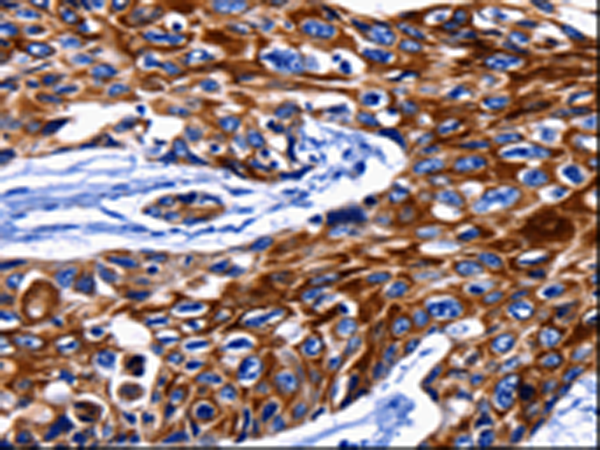
| WB | 咨询技术 | Human,Mouse,Rat |
| IF | 咨询技术 | Human,Mouse,Rat |
| IHC | 1/25-1/100 | Human,Mouse,Rat |
| ICC | 技术咨询 | Human,Mouse,Rat |
| FCM | 咨询技术 | Human,Mouse,Rat |
| Elisa | 1/500-1/5000 | Human,Mouse,Rat |
| Aliases | BIE, EHK, K10, KPP, BCIE, CK10 |
| Host/Isotype | Rabbit IgG |
| Antibody Type | Primary antibody |
| Storage | Store at 4°C short term. Aliquot and store at -20°C long term. Avoid freeze/thaw cycles. |
| Species Reactivity | Human, Mouse, Rat |
| Immunogen | Synthetic peptide of human KRT10 |
| Formulation | Purified antibody in PBS with 0.05% sodium azide and 50% glycerol. |
+ +
以下是关于KRT10抗体的3篇参考文献的简要总结,涵盖其在皮肤疾病和诊断中的应用:
---
1. **文献名称**:*Keratin 10 expression in normal skin and epidermal differentiation disorders*
**作者**:Kalinin AE, et al.
**摘要**:该研究通过免疫组化分析KRT10在正常表皮和多种角化异常疾病(如银屑病、鱼鳞病)中的表达模式,发现KRT10抗体可作为表皮分化成熟的标记物,其表达缺失与过度增殖性皮肤病相关。
---
2. **文献名称**:*Mutations in the 1A domain of keratin 10 in epidermolytic hyperkeratosis*
**作者**:Rothnagel JA, et al.
**摘要**:研究利用KRT10抗体结合基因测序技术,分析了遗传性大疱性鱼鳞病样红皮病(EHK)患者的皮肤样本,揭示KRT10基因突变导致角蛋白中间丝结构异常,抗体染色显示表皮细胞角蛋白网络紊乱。
---
3. **文献名称**:*Altered keratin expression in psoriatic epidermis visualized by antibody-based profiling*
**作者**:Bernot KM, et al.
**摘要**:通过Western blot和免疫荧光技术,发现银屑病皮损中KRT10表达显著下调,而KRT16/17上调。KRT10抗体被用于评估表皮分化障碍的分子机制,支持其作为疾病病理标志物的潜力。
---
4. **文献名称**:*Utility of KRT10 antibody in diagnosing cutaneous squamous cell carcinoma differentiation*
**作者**:Reis-Filho JS, et al.
**摘要**:研究验证了KRT10抗体在皮肤鳞癌(cSCC)中的诊断价值,发现高分化肿瘤中KRT10阳性率较高,而低分化病例中表达缺失,提示其在肿瘤分级中的辅助作用。
---
这些文献展示了KRT10抗体在表皮分化研究、遗传性皮肤病机制解析及肿瘤诊断中的应用。如需具体文章,建议通过PubMed或Google Scholar按标题检索全文。
The KRT10 antibody is a crucial tool in studying keratin 10 (KRT10), a type I intermediate filament protein encoded by the *KRT10* gene. KRT10 pairs with KRT1 to form the keratin cytoskeleton in terminally differentiated epidermal keratinocytes, providing structural integrity to the skin. It is predominantly expressed in the suprabasal layers of the epidermis, playing a vital role in maintaining epidermal barrier function and cell differentiation. Mutations in *KRT10* are linked to genetic disorders like epidermolytic ichthyosis, characterized by skin fragility and hyperkeratosis.
KRT10 antibodies are widely used in dermatopathology and research to investigate skin diseases, including psoriasis, skin cancer (e.g., squamous cell carcinoma), and wound healing. They help detect KRT10 expression levels via techniques like immunohistochemistry (IHC), Western blotting, or immunofluorescence, aiding in the diagnosis of keratinization disorders and differentiation status assessment in tumors. Commercially available monoclonal or polyclonal KRT10 antibodies are validated for specificity across human and model organism tissues. Recent studies also explore its role in epithelial-mesenchymal transition (EMT) and cancer metastasis. As a differentiation marker, KRT10 downregulation often correlates with malignancy, making it a potential target for therapeutic or diagnostic applications.
×